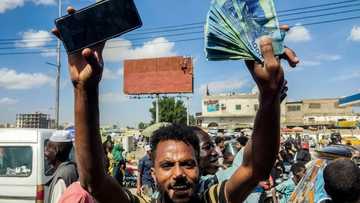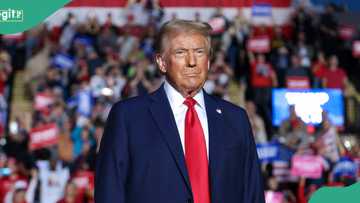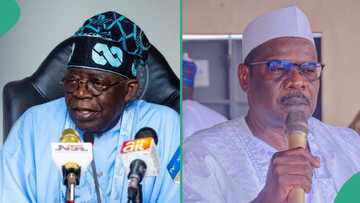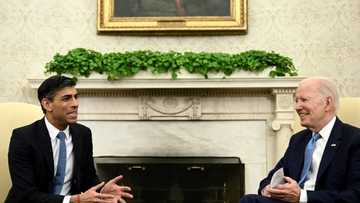10 reasons for military intervention in Nigerian politics
Military interventions happen in both totalitarian and democratic regimes. Some countries forbid citizens from criticizing the military when it intervenes in political matters. In some cases, the military allocates leadership positions during its intervention. Discover reasons for military intervention in Nigerian politics.
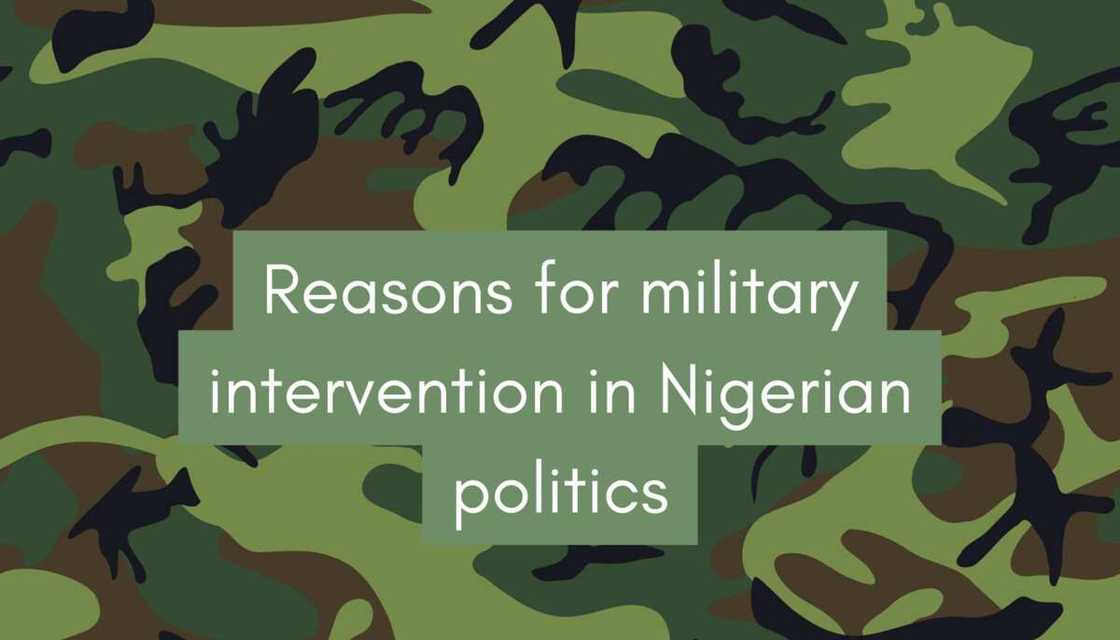
Source: UGC
The military promotes its country's constitutional order and protects resources and citizens from external and internal attacks. Military forces have strict but democratic hierarchies, whereby one must train and serve the military to rise the ranks.
What is military intervention in politics?
Military intervention is a deliberate act of armed forces to intercede in political controversies, but it does not necessarily lead to war. In other words, the military takes political power from the civilian government. There are many causes of military interventions and coups experienced in Nigeria in the past.
Reasons for military intervention in Nigerian politics
Military intervention can peacefully coexist with politics. For instance, the Emperor of Japan (during the middle age) had nominal power, while the Shogun (Supreme military commander) had real power. Below are reasons for military rule in Nigeria:
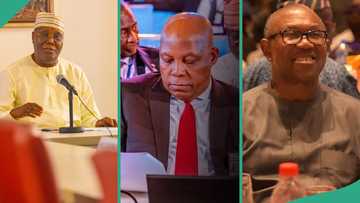
Read also
Strengthening democracy: Shettima, Abdulsalam, Atiku, Obi to discuss electoral malpractices, others
1. Unhealthy rivalry among the major tribes
A socially stable country is prone to military coups. The military promotes social cohesion in Nigeria in many ways. For instance, its barracks system comprises army officers from different cultures, religions, regions, etc., and their families.
The military's commitment to restoring law and order, peace, and security in the country is exemplary. Sanwo-Olu acknowledged the Nigerian army for promoting culture and social cohesion during the 2021 West African Social Activities (WASA) forum.
2. Corrupt leadership
Corrupt leaders are some of the causes of military intervention in politics because they undermine policies and programs to reduce poverty in the country. The military defends people's interests and can intercede if civilians elect corrupt people into government.
Since Nigeria is one of the most corrupt countries in Africa, the world might not be surprised if they surrender to military rule to prevent a coup and maintain political stability.
3. Regional political differences
Regional political differences and regionalized parties are also some of the causes of military intervention in politics. The government prevents civil war and coups by using the military to reinforce peace countrywide during elections.
In extreme cases, the military locks down some states shortly before, during, and immediately after elections. Although people claim the heavy military deployment undermines their rights and freedom, more than 400 tribes in Nigeria coexist peacefully regardless of consistent changes in the political wave.
4. The rise of rebel groups
Religious, political, and ethnic differences led to the rise of several rebel groups, including Biafra and Boko Haram. Extremist religious groups like ISIS are also a threat to the nation's peace.
Other terrorist organizations led by warlords and criminal networks are also dangerous to Nigeria's democratic regime. Hence, one of the military's top priorities is to fight and stop rebel groups from destroying the country.
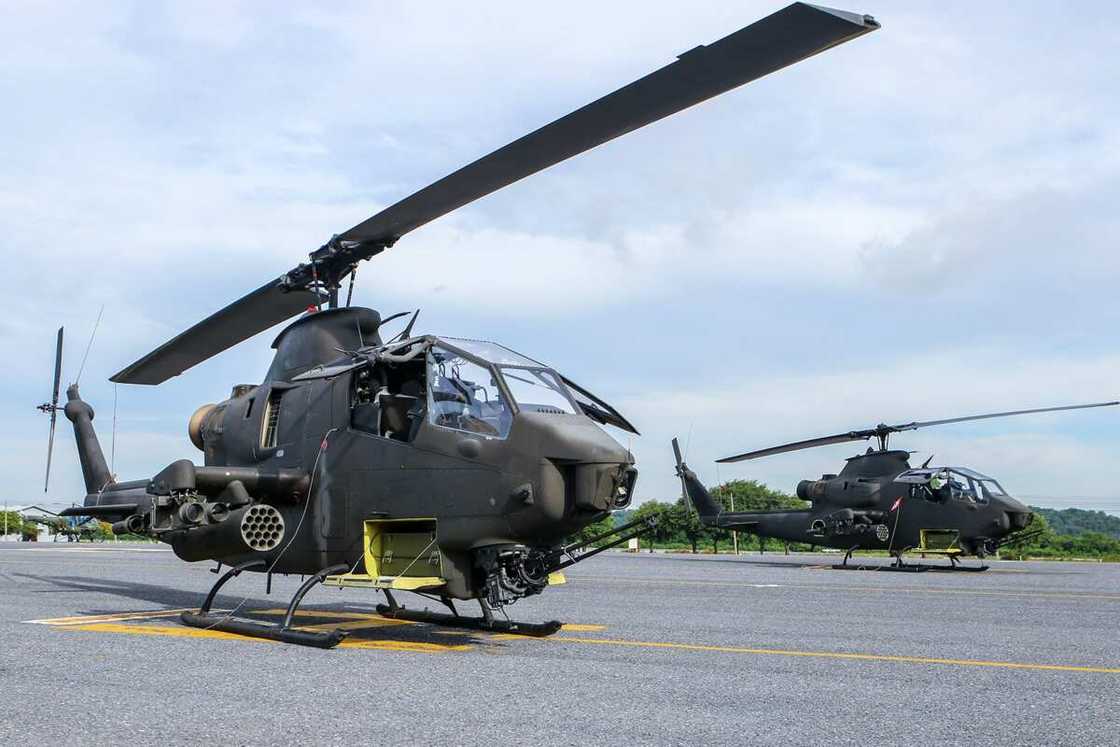
Source: UGC
5. Authoritarianism
The military has massive resources and power to protect the citizens from dictators and authoritarianism. They ensure politicians respect the country's democratic constitution and leadership. Like the US, Nigeria's military (the younger military generation) understands the importance of promoting the rule of law, human rights, and democracy.
6. Foreign complicity
Some foreign policy decisions by politicians attract military intervention. For instance, politicians initiate foreign policies and actions that create differences between Nigeria and other countries.
The military intervention builds a dialogue that facilitates further communication between Nigerian leaders and politicians from other countries. It also stops foreign powers from helping certain politicians to rise to power.
7. Hegemony
Hegemony is preponderant influence or authority over others. The military in Nigeria stops a leader, political party, or certain social group from overpowering others. Like the US, Nigeria's military spearheads initiatives for superpower parties and leaders to share the national cake (power).
8. Mismanagement of the economy

Source: UGC
Gen. Johnson Aguiyi-Ironsi (also an Igbo) installed a military government in 1966 and introduced a new constitution to unite the nation. The northern military officers killed him six months later (July 29, 1966) and replaced him with Maj. Gen. Yakubu Gowon.
After several coups, Nigeria's military stopped the oil war between Nigeria and the Republic of Biafra in the early 1990s, which had plunged the country into an economic crisis. As a result, Nigeria's oil industry is booming. It is the backbone of the nation's economic growth.
9. Tribalism and nepotism
The Nigerian military once overthrew the civilian government because of tribalism and nepotism. The Nigerian Civil Service allowed recruitment, appointments, and promotions based on tribal and family connections.
10. Electoral malpractices and rigging
Electoral malpractices like vote buying are intangible but a massive threat to an election process and democracy. Some soldiers help their friends to commit election fraud, and some politicians use the military to create a coup after losing in elections.
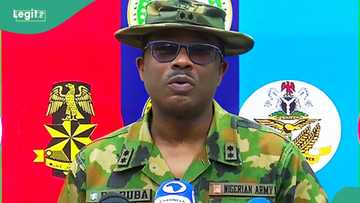
Read also
Insecurity: Concerns as Defence HQ uncovers fresh activities of foreign terrorists, details emerge
How to prevent military intervention in Nigeria politics
Some of the ways Nigeria can prevent military intervention in politics are:
- Educate people about the consequences of tribal politics through mass sensitization programs.
- Implement policies that punish corrupt leaders.
- Enact laws that promote a high level of commitment and accountability from politicians.
- The government should lay strategies for electoral malpractices and rigging.
- The law should prevent politicians from using armed forces to plan coups when they lose elections.
- The government should have laws that punish soldiers who intervene in politics to help their friends.
- The government should allow soldiers and civilians to share power to prevent coups.
- The government should invest in army intelligence technologies and skilled people who can detect and report coup attempts.
Who led the first military intervention in Nigeria?
Lt. Colonel Murtala Muhammed, soldier Chukwuma Kaduna Nzeogwu, and soldier Emmanuel Ifeajuna were among the military soldiers who executed the first Nigerian coup d'état in January 1966. Twenty-two people died, including the Prime Minister of Nigeria, senior army officers (and their wives), senior politicians, and sentinels on protective duty.
What happens in a military coup?
A political faction, rebel group, military, or dictator illegally takes control over a government and its powers.
Why do military interventions happen?
Military interventions protect, defend, or rescue people from abuse from their government. More than one person, state, or organization can execute military interventions.
A thorough examination of the reasons for military intervention in Nigerian politics reveals that the military has good intentions for civilians. It intervenes in political issues to stabilize the economy and promote peace in the country.
READ ALSO: Political parties in Nigeria in 2022, their logos and leaders
Legit.ng also shared detailed information about political parties in Nigeria in 2022, their logos and their leaders. INEC reduced political parties in Nigeria from 92 to 18 in 2020.
Some of the 74 deregistered parties are still active, and new ones are still sprouting. Check out the logos of 18 legally registered political parties in Nigeria.
Source: Legit.ng

Peris Walubengo (Lifestyle writer) Peris Walubengo has vast experience in search engine optimization through digital content generation, research, editing, and proofreading. She joined Legit.ng in April 2022 and completed the AFP course on Digital Investigation Techniques. You can email her at perisrodah254@gmail.com.

Adrianna Simwa (Lifestyle writer) Adrianna Simwa is a content writer at Legit.ng where she has worked since mid-2022. She has written for many periodicals on a variety of subjects, including news, celebrities, and lifestyle, for more than three years. She has worked for The Hoth, The Standard Group and Triple P Media. Adrianna graduated from Nairobi University with a Bachelor of Fine Arts (BFA) in 2020. In 2023, Simwa finished the AFP course on Digital Investigation Techniques. You can reach her through her email: adriannasimwa@gmail.com


